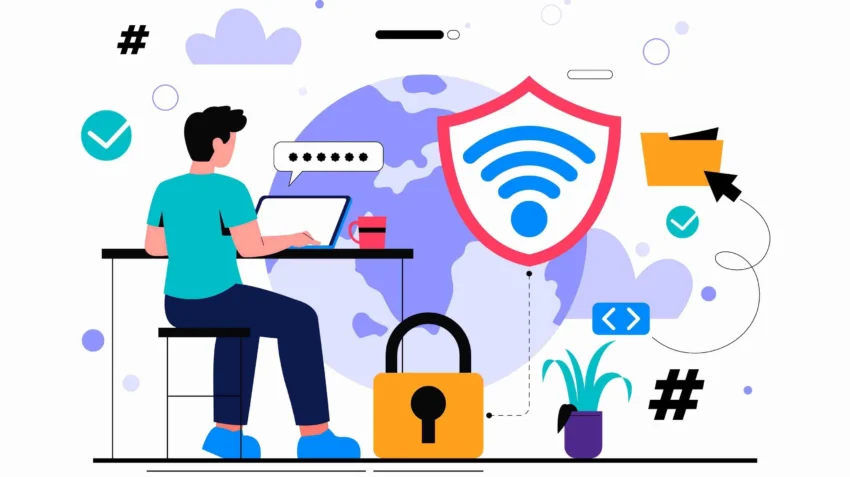Let’s be real for a second—most of us could be a little better with online privacy. We click “Accept All” on cookies without a second thought, give away our email for “10% off,” and probably have at least one password that’s just “password123.” But with data breaches happening faster than we can click “unsubscribe,” it’s time to stop these risky habits. The truth is, staying safe online isn’t about becoming paranoid; it’s about being smart and knowing where the biggest privacy pitfalls are hiding.
In this guide, we’ll go over five of the most common online privacy mistakes that even the smartest internet surfers are guilty of making. By the end, you’ll know exactly how to plug these privacy holes and protect yourself. Let’s get into it!
Using Weak or Repeated Passwords
Ah, passwords. It seems so simple, right? Just choose something easy to remember, like your dog’s name, and tack on “123.” But here’s the thing: weak passwords are the first stop for hackers, and reusing them across multiple accounts is like handing them a skeleton key to your digital life.
Using “password123” or your birth year as a password, using the same password for Facebook and your online banking account, or never changing your passwords.
So, how to avoid this?
- Go Long and Complicated: Ideally, passwords should be at least 12-16 characters long with a mix of uppercase letters, lowercase letters, numbers, and special symbols.
- Use a Password Manager: Forget trying to remember a hundred different passwords. Use a password manager to securely generate and store your passwords.
- Enable Two-Factor Authentication (2FA): For an extra layer of security, always use 2FA whenever it’s offered.
Ignoring Software Updates
Yes, we all get tired of that pop-up that says “Install Update?” and the temptation to click “Remind Me Later” is real. However, putting off these updates can expose you to serious security vulnerabilities. Many updates fix critical security flaws, and if you’re running outdated software, you’re essentially hanging out a “Welcome” sign for hackers.
Skipping the latest iOS or Android update, not updating your browser, or neglecting your antivirus software updates. The easiest way to avoid this is to let your device handle updates for you. If you’re someone who prefers manual updates, mark your calendar. Every month, do a quick check for any updates that you might have missed. It’s easy to forget, but outdated extensions can also have vulnerabilities. Take a quick glance at these every now and then to make sure they’re current.
Falling for Phishing Scams
Phishing is the art of online trickery, and sadly, it’s everywhere. Whether it’s a fake email from your “bank,” a message from your “boss,” or an official-looking notification about “unusual activity on your account,” phishing scams are incredibly convincing. Falling for one could mean handing over your login info or even worse—access to your finances.
Clicking on a link in an email that “looks legit,” entering your details on a sketchy website, or downloading an attachment from an unknown sender.
If you get a weird email or message with a link, don’t click it. Go directly to the site (like your bank’s website) instead. Phishers often use addresses that look legit at first glance, but a closer look might reveal that it’s a trick. Many email services offer spam filters that can catch most phishing attempts before they even reach your inbox.
Over-Sharing on Social Media
We get it—sharing photos, checking in, and updating your status are all part of the fun. But what you might not realize is that over-sharing personal details can create a digital footprint that’s a dream for data collectors and a treasure map for hackers.
Sharing your travel plans publicly, giving out too much information about your job, posting your birthday or full name, or checking in to locations in real-time.
Most social media platforms allow you to control who sees your posts, so make sure you’re only sharing with people you trust. Before posting, think about what information you’re giving away and who might see it. Consider posting those vacation photos after you’re back instead of while you’re still away. This keeps your location private and limits real-time tracking.
Not Checking App Permissions
Did you know that some apps on your phone could be tracking you, recording audio, or even accessing your camera without you realizing it? Every time you install a new app, you’re often prompted to give it permission to access certain parts of your phone. Too often, we just click “Allow” without thinking.
Giving an app access to your location 24/7, allowing access to your contacts list when it’s not necessary, or letting an app use your microphone or camera for no good reason.
Only give apps the permissions they need to function. For example, a calculator app shouldn’t need access to your camera. Check your phone’s settings periodically to review which apps have which permissions. If something seems unnecessary, turn it off. If you have apps you don’t use anymore, delete them! Not only does this reduce permissions access, but it also saves space and keeps your phone running smoother.
Conclusion
Online privacy mistakes happen to the best of us. With a few simple changes to your habits, you can keep your information out of the hands of data miners, hackers, and even that nosy “friend” who’s always scrolling through your profile. By securing your passwords, updating your software, watching out for phishing, being mindful of what you share, and controlling app permissions, you’re setting up a privacy fortress around your online life.
So, let’s keep our personal info personal and give those hackers a harder time. It’s not about paranoia; it’s about privacy peace of mind! Happy browsing, and stay safe online!

